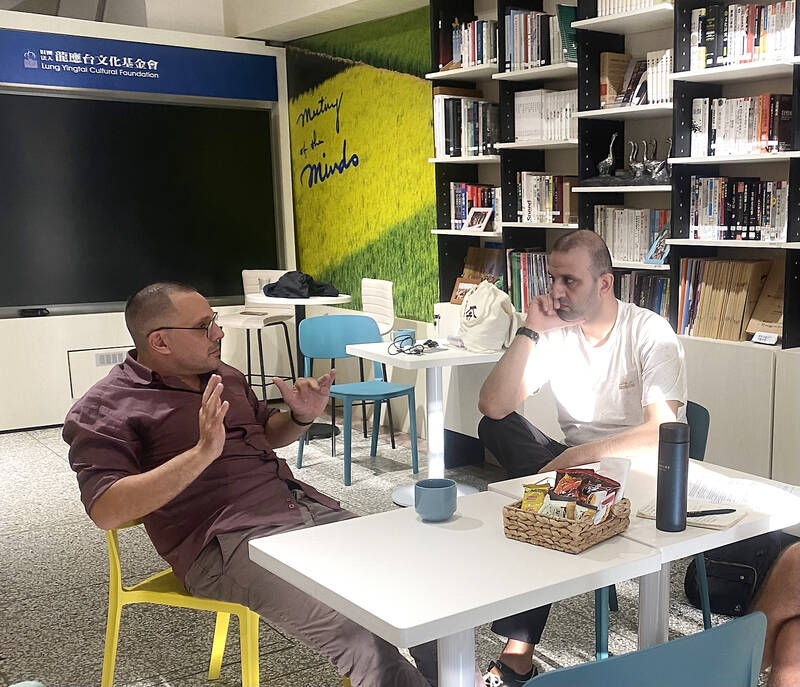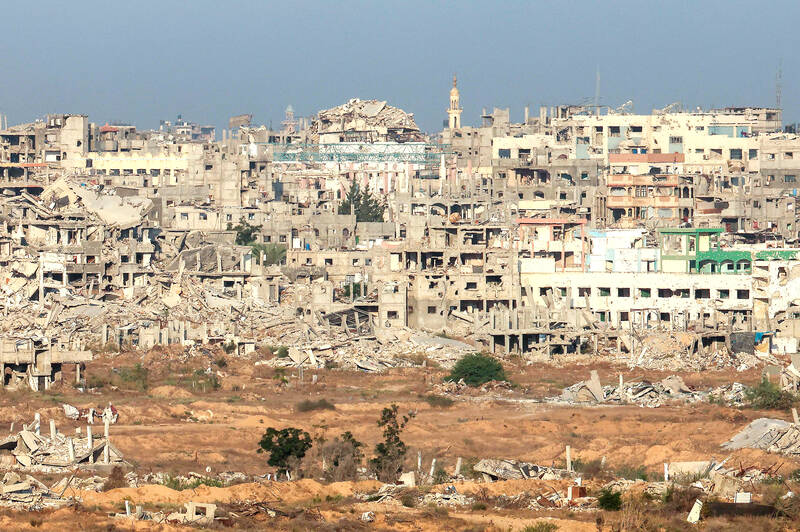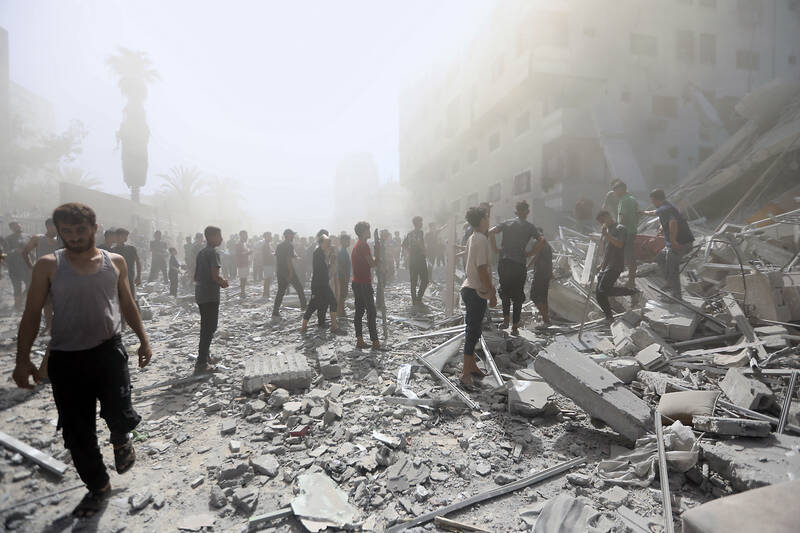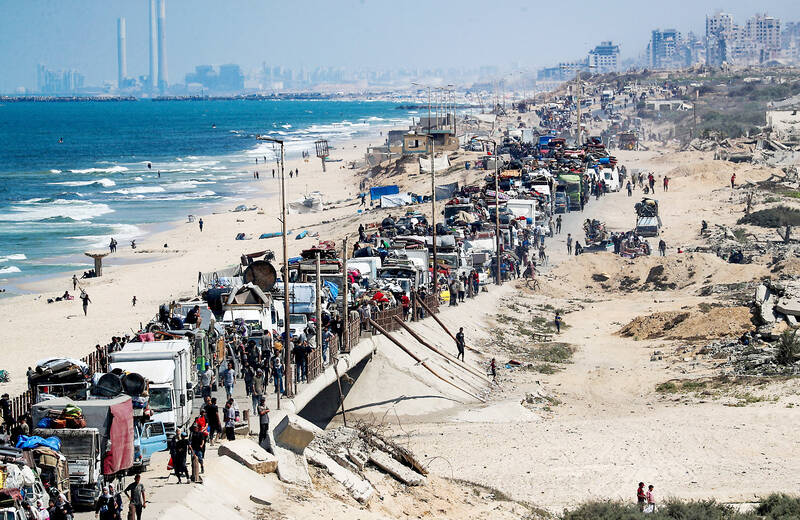Gaza is an abstraction. It’s video on social media, pictures on a news feed, text on a page. It’s statistics in a UN report and condemnation from the International Criminal Court. It’s enormity is impossible to grasp.
Roi Silberberg and Hazem Almassry aren’t interested in abstractions. For them what is happening in Gaza by the Israeli military is all too real. They aren’t interested in talking about the inaction of the international community. They aren’t interested in talking about a two-state solution. They aren’t interested in talking about peace. They aren’t interested in talking about these things because they’ve all been talked about before. Yet the killing and the destruction continues.
“I’m not here to talk about peace, just to make people aware of what is happening there and not to support it, especially here in Taiwan,” Almassry said.

Photo courtesy of the Lung Ying-tai Cultural Foundation
A conversation with Silberberg and Almassry is unsettling. You get the feeling that no matter what question you ask, they’ve heard it all before and are just going through the motions in the hope that something, anything, will change, while existing in the awareness that things will remain the same. But that’s precisely why the speech between a Palestinian and an Israeli is necessary. Perhaps we need to be unsettled.
Silberberg and Almassry will share a stage on Saturday at the Taipei International Peace Forum. Hosted by the Lung Ying-tai Cultural Foundation, they are among the seven “peace fellows” from throughout the globe that will discuss a wide array of topics related to peace, including climate change, misinformation, sustainability and war.
The day-long event, held in English with simultaneous interpretation in Mandarin, is open to the public. For registration and a complete list of speakers, visit: civictaipei.org/en/peace-program/peace-forum (bottom of page). Admission is free.

Photo: AFP
Silberberg has traveled from Israel where he is director of the School for Peace, an NGO that has long promoted political dialogue and critical peace education between Palestinians and Jews. Almassry, an eight-year resident of Taiwan who was born in Gaza, is a researcher at Academia Sinica. His memoir, Fragments of an Unbroken Spirit: A Gaza Memoir will be published later this year.
Silberberg and Almassry sat down with the Taipei Times to discuss their current feelings about Israel’s war on Gaza, why it’s so difficult for Palestinians and Israeli Jews to have a meaningful conversation and their upcoming talk in Taipei. This interview has been condensed and edited.
Taipei Times: In a TED talk in April last year Palestinian peace activist Aziz Abu Sarah asked Israeli peace activist Maoz Inon how he remains committed to peace after the killing of his parents during the Hamas attacks on Oct. 7, 2023. How does one remain committed to peace in light of such tragedy and what has happened subsequently?

Photo: AP
Roi Silberberg: You can’t talk about peace and about living together at this moment in history. It’s legitimate to talk about that. But there is also what is happening in reality and the question of how to stop it. And these are different things. They are different in a way, and they get different reactions. I can say right after Oct. 7 we were writing a text for the School for Peace and we wrote that the Israeli military response is vindictive, meaning that the part of its goal is revenge ...
So if you are talking about peace, usually it’s less bad because it’s less threatening in my society. But right now, talking about starvation and about genocide and about war crimes it’s sort of taboo and I often break this taboo and it has consequences.
TT: In a forum last year called Peaceful Co-Existence Among Israelis and Palestinians, “What do we owe each other?” Tehila Wenger, citing a poll from last year about the two-state solution, says 37 percent of Israeli’s support a two-state solution. One state solution with less rights for Palestinians, was 20-25 percent and one-state solution for all rights for all was 6.6 percent. Is it still possible to talk about a two-state solution?

Photo: Reuters
RS: We are not in that stage at all. I have an opinion [on this], if we were in the solution stage and there was some kind of consensus. But we are not at that stage. And what we should be talking about is how people should let go of the fantasy that they can go it alone, that they should realize their life is dependent on others and they should not try to control everything because they will never control everything and get all that they want.
Hazem Almassry: I agree with Roi. It isn’t the time to talk about peace. We want to focus on what is happening now — starvation, the genocide, stopping this first — otherwise talking about peace is pointless. And we want also to consider that talk about peace always happens between equal powers and we need to acknowledge the imbalance [between Israelis and Palestinians]. As writer Ghassan Kanafani said, it would be a talk between sword and neck.
The entire issue relies on what the Israelis decide. If Israel decides to solve it, it will be solved. If they decide just to manage it as they have been doing for the past 75 years, we will continue along the same path. One-state, two-state, 10-state solution, I don’t mind, it’s no problem for me. We want to face it, but they don’t want to face it because any solution means they would have to return what they have taken from us. But they don’t want to return anything.
To be honest, I’m not here to talk about peace, just to raise awareness of what is happening there and not to support it, especially here in Taiwan. The mood is generally in support of Israel, [Taiwanese] tend to believe the Israeli narrative and they have zero sympathy with Palestinians.
TT: Do you think the international community, especially in the last few months, is changing its perspective on that narrative?
HA: Yes, I think the whole perspective on Palestine is shifting. But it doesn’t change anything. The Israelis are still starving the Palestinians and using Israeli fire power against them... [B]ut it’s not changing anything because there isn’t a real shift in the White House and the [US] public.
TT: So that shift will only be meaningful once the American public puts pressure on the White House? Canada, for example, backing a Palestinian state isn’t going to have that much impact?
HA: Canada has expressed their willingness to recognize Palestine. But even with that recognition, it’s not enough compared to what we’ve seen on the ground. It is a very small action compared to the huge tragedy. They just want to save face by taking such action. But if they want to really [address] such adversity they can do the same as they did when Russia invaded Ukraine.
TT: What goes through your mind when you first meet an Israeli or Palestinian?
RS: The majority of Palestinians and the majority of Jews are not in a position to really meet each other. Really meeting the other involves exposing yourself and the majority of the people in this situation at this historic point, are not there.
Most of the people who come to our activities are people that feel that they want to do something big, like to cross their borders and the fantasy of ‘what can I achieve with dialogue’ and all of that. But the majority of people that come now, it is very urgent for them. They think it’s really important at this time to meet the other.
What was usually very hard to fill a course with 12 Palestinians and 12 Jews is much easier now because the people who come are really willing to commit to several meetings and they are willing to commit for the activities.
When I meet someone I try to figure out where are they. Are they in a place where they are willing to expose themselves? Are they in a place where they are willing to hear me?
HA: I have an impression of Israelis. I know they are not all alike when dealing with Palestinians... I know there is a group of people like Roi who believe in peace and believe in equality and justice for everyone. But the majority support the apartheid system and the occupation. So when I meet an Israeli I have this impression in mind.
TT: Roi, why have you traveled to Taiwan to share a stage with Hazem?
RS: I’m trying to figure out what to do. As you were talking about the international community acting differently with Russia than they are Israel ... I think there is something broken. For me it’s a learning trip. I’m not sure what the Taiwanese can do. I’m not sure if I can give them the full picture. But I’m trying to figure out what I can do. Going to demonstrations is good. But it’s not changing anything. It’s two years. It’s a crazy house and not even talking about the damage that it is causing. Just the effort to make this damage is crazy. How much effort to put into this damage.
And the Israeli army is demolishing house by house. I don’t know from which perspective to analyze this. I’m not sure what I will learn [in Taiwan], but I know I must learn something and that with the School for Peace we can influence many people and to make them realize this is the most important factor influencing their lives, and they can’t ignore it.
HA: We are not here to offer solutions or draw road maps ... I’m here to give my testimony and maybe a little bit of analysis. I’m not a policy maker or politician. I lived under the Israeli occupation. I lived under the Palestinian Authority. I lived under Hamas. I lived in the diaspora and I have my testimony. I’m not in a position to force [Taiwanese] or even convince them to adopt my [position]. Even now, after all of these atrocities after all of these losses, I’m not interested or I don’t care what people think about my story.

Growing up in a rural, religious community in western Canada, Kyle McCarthy loved hockey, but once he came out at 19, he quit, convinced being openly gay and an active player was untenable. So the 32-year-old says he is “very surprised” by the runaway success of Heated Rivalry, a Canadian-made series about the romance between two closeted gay players in a sport that has historically made gay men feel unwelcome. Ben Baby, the 43-year-old commissioner of the Toronto Gay Hockey Association (TGHA), calls the success of the show — which has catapulted its young lead actors to stardom -- “shocking,” and says

The 2018 nine-in-one local elections were a wild ride that no one saw coming. Entering that year, the Chinese Nationalist Party (KMT) was demoralized and in disarray — and fearing an existential crisis. By the end of the year, the party was riding high and swept most of the country in a landslide, including toppling the Democratic Progressive Party (DPP) in their Kaohsiung stronghold. Could something like that happen again on the DPP side in this year’s nine-in-one elections? The short answer is not exactly; the conditions were very specific. However, it does illustrate how swiftly every assumption early in an

Inside an ordinary-looking townhouse on a narrow road in central Kaohsiung, Tsai A-li (蔡阿李) raised her three children alone for 15 years. As far as the children knew, their father was away working in the US. They were kept in the dark for as long as possible by their mother, for the truth was perhaps too sad and unjust for their young minds to bear. The family home of White Terror victim Ko Chi-hua (柯旗化) is now open to the public. Admission is free and it is just a short walk from the Kaohsiung train station. Walk two blocks south along Jhongshan

Jan. 19 to Jan. 25 In 1933, an all-star team of musicians and lyricists began shaping a new sound. The person who brought them together was Chen Chun-yu (陳君玉), head of Columbia Records’ arts department. Tasked with creating Taiwanese “pop music,” they released hit after hit that year, with Chen contributing lyrics to several of the songs himself. Many figures from that group, including composer Teng Yu-hsien (鄧雨賢), vocalist Chun-chun (純純, Sun-sun in Taiwanese) and lyricist Lee Lin-chiu (李臨秋) remain well-known today, particularly for the famous classic Longing for the Spring Breeze (望春風). Chen, however, is not a name